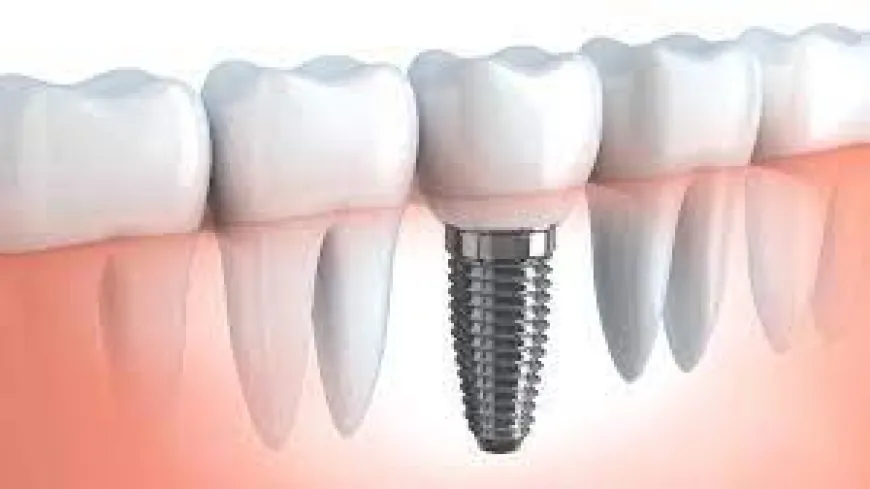Dental Implants Everything You Need to Know
Do you have a missing tooth? Do you want to get it replaced with an implant? We've got you covered. Read to learn more about Dental Implants in Dubai, Abu Dhabi.

Dental implants have revolutionized the field of restorative dentistry, offering a durable and aesthetically pleasing solution for missing teeth. This comprehensive guide will provide you with everything you need to know about Dental Implants in Dubai, including their types, benefits, procedures, aftercare, and costs.
What Are Dental Implants?
Dental implants are artificial tooth roots made from biocompatible materials, typically titanium. They are surgically placed into the jawbone to serve as a sturdy foundation for replacement teeth or bridges. Unlike dentures or bridges, implants are anchored directly into the bone, providing stability and preventing bone loss.
Components of a Dental Implant:
A dental implant consists of three main components:
- Implant Fixture: The titanium post is inserted into the jawbone, which serves as the tooth root.
- Abutment: A connector is placed on top of the implant fixture to hold the replacement tooth.
- Crown: The visible part of the tooth, custom-made to match the surrounding natural teeth.
Types of Dental Implant:
There are several types of dental implants available, each designed to meet specific needs:
Endosteal Implants:
These are the most common types of dental implants. They are inserted directly into the jawbone and are typically shaped like small screws. Endosteal implants are suitable for most patients with sufficient bone density.
Subperiosteal Implants:
Subperiosteal implants are placed under the gum but above the jawbone. They are often used for patients who do not have enough healthy jawbones for endosteal implants and do not wish to undergo bone augmentation procedures.
Zygomatic Implants:
These implants are anchored in the cheekbone (zygoma) instead of the jawbone. Zygomatic implants are a solution for patients with severe bone loss in the upper jaw, allowing them to avoid bone grafting procedures.
Benefits of Dental Implants:
Dental implants offer numerous advantages compared to traditional tooth replacement options:
Improved Functionality:
Implants function like natural teeth, allowing patients to chew and speak without difficulty. They do not slip or shift, providing a secure fit.
Aesthetic Appeal:
Custom-made crowns can be designed to match the color and shape of your natural teeth, resulting in a seamless appearance.
Bone Preservation:
When a tooth is lost, the jawbone can deteriorate over time. Dental implants stimulate the bone, preventing further bone loss and maintaining facial structure.
Longevity:
With proper care, dental implants can last a lifetime, making them a cost-effective solution in the long run.
Easy Maintenance:
Dental implants require the same care as natural teeth, including regular brushing, flossing, and dental check-ups.
The Dental Implant Procedure:
The dental implant process typically involves several stages, which can take several months to complete. Here’s a breakdown of the steps involved:
Consultation and Planning:
During your initial consultation, your dentist will evaluate your oral health and take X-rays or 3D scans of your jaw. This assessment helps determine the best implant type and placement.
Bone Grafting:
If you do not have sufficient bone density, you may need a bone grafting procedure to create a solid foundation for the implant. This process can take several months for the graft to heal.
Implant Placement:
Once your jawbone is ready, the dental implant is surgically placed into the bone. This procedure is typically done under local anesthesia and may involve a few hours of surgery.
Healing Period:
After the implant is placed, a healing period of 3 to 6 months is necessary for the bone to fuse with the implant in a process called osseointegration. During this time, a temporary crown may be placed to maintain aesthetics and functionality.
Abutment Placement:
Once healing is complete, an abutment is attached to the implant, serving as the connector for the final crown. This may require a minor surgical procedure.
Final Restoration:
After the gum has healed around the abutment, impressions are taken to create the custom crown. Once ready, the crown is securely attached to the abutment, completing the process.
Aftercare for Dental Implants:
Proper aftercare is crucial for the longevity and success of dental implants. Here are some key aftercare tips:
Maintain Oral Hygiene:
Brush your teeth twice daily and floss regularly to keep your mouth clean. Consider using an antibacterial mouthwash to reduce the risk of infection.
Regular Dental Visits:
Schedule regular check-ups with your dentist to monitor the health of your implants and surrounding teeth.
Avoid Hard Foods:
In the initial healing phase, avoid hard or sticky foods that could stress the implant or cause damage.
Quit Smoking:
Smoking can hinder the healing process and increase the risk of implant failure. Quitting smoking can significantly improve your chances of success.
Costs of Dental Implants:
The cost of dental implants can vary widely based on several factors:
Location:
Prices can differ depending on the geographical location of the dental practice.
Complexity of the Procedure:
The complexity of your case, including any necessary bone grafting, can influence the overall cost.
Type of Implant:
The type of implant selected (endosteal, subperiosteal, or zygomatic) can also affect the price.
Dentist’s Expertise:
The experience and qualifications of the dental professional performing the procedure may impact the cost.
Insurance Coverage:
Many dental insurance plans do not cover the full cost of implants. It’s essential to check with your provider to understand your coverage.
Conclusion:
Dental implants represent a transformative solution for individuals facing tooth loss. With their durability, aesthetic appeal, and ability to preserve jawbone health, they are an excellent investment in your oral health. If you are considering dental implants, consult with a qualified dental professional to discuss your options and create a personalized treatment plan tailored to your needs.
What's Your Reaction?
 Like
0
Like
0
 Dislike
0
Dislike
0
 Love
0
Love
0
 Funny
0
Funny
0
 Angry
0
Angry
0
 Sad
0
Sad
0
 Wow
0
Wow
0



















































